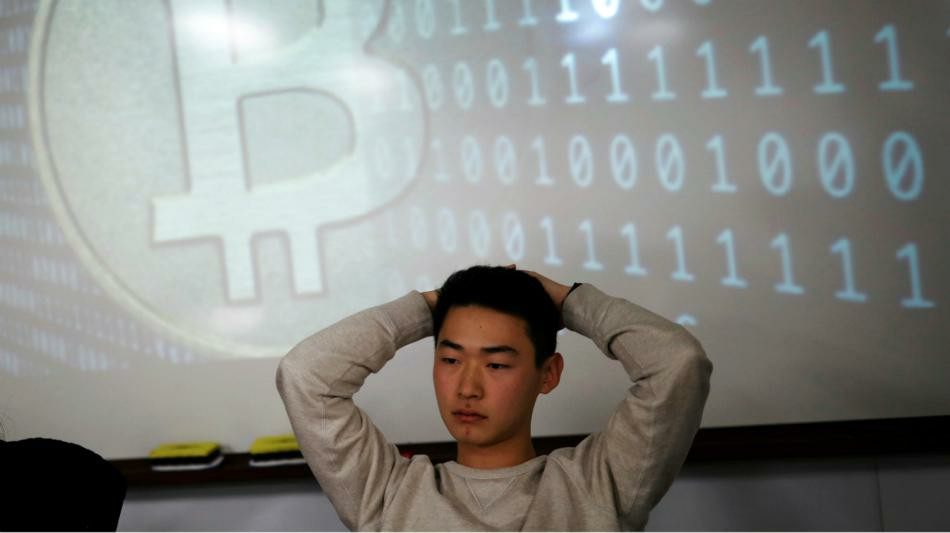
Brian Jeong remembers the frenzy that swept through South Korea this time last year.
From coffee shops to fast food joints across the sprawling capital city of Seoul, a new obsession emerged seemingly out of nowhere.
“Last winter,” the analyst at BlockWater Capital, a digital asset investment firm, recalled, “you would hear senior citizens, like ladies and gentlemen, eating fried chicken, talking about bitcoin.”
“And at all cafes, at every table,” added Erica Kang, a partner at the firm. “Suddenly, it was just like a hyped thing.”
And what hype it was.
Frustrated by limited investing opportunities in a stagnant economy, angered by hopeless politics, and driven by greed, millions of Koreans hopped aboard the cryptocurrency bandwagon as bitcoin took off on its extraordinary run in late 2017. The momentum was such that, by late December, according to one survey, three out of every 10 salaried workers in Korea had invested in cryptocurrencies.
Once a relative crypto backwater, Korea rapidly emerged as one of the world’s largest markets for bitcoin and ethereum, as investors tripped over each other for a piece of the action. At its peak, the “Kimchi premium”—or the extra that Koreans paid for cryptocurrencies versus global price benchmarks—swelled to 50%.
The party ended far more abruptly than it began, as the Korean government, belatedly, swooped in to tamp down on the unregulated speculative frenzy. Tumbling cryptocurrency prices further took the wind out of the market. The mania died quickly, painfully.
Yet, from the ashes of the crypto craze, a blockchain boom has emerged. There are already projects underway, backed by heavyweight local businesses, that could bring services built on blockchain platforms into the lives of almost every Korean. Beyond the private sector, government agencies are also embracing distributed ledgers, including a blockchain-based voting system.
If successful, these projects would bring blockchain into the mainstream in one of the world’s most advanced economies. Even more notably, this is all taking place in a remarkable regulatory limbo.
The chaos
The Korean government first got to grips with cryptocurrencies, as Park Sung-joon tells it, in late 2016 when the Korea Internet and Security Agency, part of the ministry of science, started studying the ecosystem.
“They started speaking to experts,” said Park, head of a blockchain research center at Seoul’s Dongguk University. It was a period of extraordinary political turmoil in Korea, with the impeachment of president Park Geun-hye followed by elections in the summer of 2017, which brought Moon Jae-in to power.
The messy politics, together with high youth unemployment and a sluggish economy, served as a catalyst to stoke interest in crypto. “Everyone was feeling betrayed… there was just a lack of trust for corporations and the government,” a Seoul-based lawyer explained, requesting anonymity. “They saw this cryptocurrency as more of a messiah. This is the only way out of this misery.”
With few Know Your Customer (KYC) requirements to comply with, ordinary Koreans opened anonymous trading accounts at a dozen or so cryptocurrency exchanges and began playing the market. “At that time, some of my friends in United States were only able to buy few hundred of dollars of cryptocurrency on Coinbase,” a major Korean blockchain investor said, requesting anonymity, “but some of my friends in Korea, some of them even sold their houses to buy into cryptocurrency.”
Then, starting in May 2017, around the time the Moon administration took office, a series of initial coin offerings (ICOs) in the country drew investor interest, raising millions.
The news spread like wildfire in a country where things can go viral very fast. “There was the FOMO [fear of missing out] effect and the South Korean public went crazy over this investment opportunity,” BlockWater Capital’s Kang said. “It was like a national movement, basically.”
The crackdown
Suddenly, in September 2017, the government banned ICOs. “The government didn’t have much time to prepare putting together a policy about blockchain and cryptocurrency,” said Park of Dongguk University. “So, they just got busy banning ICOs, because that way, they thought, they can protect the investors.”
To be clear, there wasn’t any legislation enacted, or an explicit policy announced. ‘There’s nothing that says ICOs are banned, but there’s a strong push against ICOs,” said Daniel Lee, a lawyer at law firm Kobre & Kim’s Seoul office, who specializes in cryptocurrency matters.
Yet, from the ashes of the crypto craze, a blockchain boom has emerged. There are already projects underway, backed by heavyweight local businesses, that could bring services built on blockchain platforms into the lives of almost every Korean. Beyond the private sector, government agencies are also embracing distributed ledgers, including a blockchain-based voting system.
If successful, these projects would bring blockchain into the mainstream in one of the world’s most advanced economies. Even more notably, this is all taking place in a remarkable regulatory limbo.
The chaos
The Korean government first got to grips with cryptocurrencies, as Park Sung-joon tells it, in late 2016 when the Korea Internet and Security Agency, part of the ministry of science, started studying the ecosystem.
“They started speaking to experts,” said Park, head of a blockchain research center at Seoul’s Dongguk University. It was a period of extraordinary political turmoil in Korea, with the impeachment of president Park Geun-hye followed by elections in the summer of 2017, which brought Moon Jae-in to power.
The messy politics, together with high youth unemployment and a sluggish economy, served as a catalyst to stoke interest in crypto. “Everyone was feeling betrayed… there was just a lack of trust for corporations and the government,” a Seoul-based lawyer explained, requesting anonymity. “They saw this cryptocurrency as more of a messiah. This is the only way out of this misery.”
With few Know Your Customer (KYC) requirements to comply with, ordinary Koreans opened anonymous trading accounts at a dozen or so cryptocurrency exchanges and began playing the market. “At that time, some of my friends in United States were only able to buy few hundred of dollars of cryptocurrency on Coinbase,” a major Korean blockchain investor said, requesting anonymity, “but some of my friends in Korea, some of them even sold their houses to buy into cryptocurrency.”
Then, starting in May 2017, around the time the Moon administration took office, a series of initial coin offerings (ICOs) in the country drew investor interest, raising millions.
The news spread like wildfire in a country where things can go viral very fast. “There was the FOMO [fear of missing out] effect and the South Korean public went crazy over this investment opportunity,” BlockWater Capital’s Kang said. “It was like a national movement, basically.”
The crackdown
Suddenly, in September 2017, the government banned ICOs. “The government didn’t have much time to prepare putting together a policy about blockchain and cryptocurrency,” said Park of Dongguk University. “So, they just got busy banning ICOs, because that way, they thought, they can protect the investors.”
To be clear, there wasn’t any legislation enacted, or an explicit policy announced. ‘There’s nothing that says ICOs are banned, but there’s a strong push against ICOs,” said Daniel Lee, a lawyer at law firm Kobre & Kim’s Seoul office, who specializes in cryptocurrency matters.

Within just 18 months, the project accelerator and investment fund they called Hashed built up an investment portfolio worth $250 million. Kim, in an interview earlier this year, declined to reveal the size of the current portfolio, only confirming that, “We are one of the largest crypto funds in Asia.”
Hashed’s holdings include ICON, backed by a subsidiary of the Korean fintech giant Dayli Financial Group, which describes itself as one of the largest blockchain networks in the world. The project is attempting to build a decentralized network that allows independent blockchains to transact with one another without intermediaries.
ICON cut its teeth by rolling out the world’s first blockchain-based authentication service for the financial industry. Launched in October 2017, it was built for the Korea Financial Investment Association, a self-regulatory body, serving subsidiaries of major Korean financial institutions. In its early days, the project also built similar private blockchain services for the Korea’s insurance, healthcare, and education sectors.
Yet it’s the more recent partnerships that reveal the potential reach of ICON’s platform. In May, ICON announced it was building a blockchain ecosystem, complete with tokens, for Japan’s LINE Corporation, which runs a messaging app with some 200 million users. LINE is owned by Naver Corporation, an internet company that runs Korea’s biggest search engine.
Then, in September, ICON unveiled a collaboration with SK Group, one of Korea’s largest conglomerates, to bring blockchain technology to OK Cashbag, a loyalty program that reaches some 37 million Koreans, about 70% of the country’s population.
Just a year ago, the focus was elsewhere. “No one cared about blockchain. Everyone’s focus was on cryptocurrency and ICOs,” said Henry Lee, head of global business at ICON. That mania helped create awareness on a massive scale which, in part, led to Korean businesses queuing up to try out blockchain projects.
Kakao, a $7 billion internet company that runs South Korea’s largest messaging app, is among those with a newfound interest in blockchain technology. In March, it set up Ground X, a Tokyo-headquartered subsidiary, to develop Klaytn. This platform is targeted at companies with services that could be supported by blockchain but lack the necessary expertise.
“I see different ways of the using blockchain,” explained Lee Jong-gun, a member of the Ground X leadership team, “replacing the whole business, or taking some components to replace them. Or, if they just want to keep the business as usual, and then put additional elements on blockchain.”
Klaytn, which is slated go live early next year, has already partnered with at least nine enterprises, spanning sectors from healthcare and gaming to digital advertising and finance. The goal is to create a blockchain service suitable for mass adoption that will, at some point, also find use for Kakao’s 50 million users, who are mostly in Korea.
“When they will add a crypto wallet on top of Kakao Talk [Kakao’s messaging app] that means every single South Korean will have cryptocurrency,” Hashed’s Kim said. “That will be the game changer.”
The complications
Both Ground X and ICON have attracted interest from the Korean government, in a good way.
In June, Ground X said it was partnering with an agency of the Seoul metropolitan government to jointly develop blockchain projects for the public sector. Months later, Seoul’s mayor, Park Won-soon, unveiled a five-year-plan, including investments worth over $150 million, to turn the Korean capital into a blockchain hub.
ICON, too, is working with the government institutions on multiple initiatives. In late October, it showcased a project allowing users to create an ID card, use it to vote via a smartphone, and be rewarded in cryptocurrency—all powered by blockchain, naturally. The voting system was built under the supervision of the National Election Commission, which has been working with ICON since July to use blockchain to improve candidate registration, voting, and the counting of ballots.
But for all the corporate investment and public-private bonhomie around blockchain, the Korean government retains its dislike for cryptocurrency. This complicates things for blockchain projects that rely on tokens to run, even if they are meant to facilitate transactions rather than be used for speculation in their own right. There is little clarity on the official stance for other crucial issues, too, including definitive rules on ICOs and taxation.
Part of the problem is disagreements within the government. “The ministry of planning and finance support crypto to gain tax, and also ministry of science and technology supports crypto,” the major blockchain investor said. “But the ministry of justice and some government departments are very conservative.”
This dissonance may have to do with the haphazard handling of crypto regulation during the boom. In late 2017 the government initially assigned the FSC to cool the markets and kill the kimchi premium, explained Park Jong-baek, a partner at Seoul’s BKL law firm. “But after that, they moved it to ministry of justice. And then, they moved it to the prime minister’s office,” Park added. “In the course of doing that there was no organized logic or policy.”
Individual lawmakers have shown some interest in bringing clarity to the issue, but none of their draft bills have made headway in parliament. The recent slide in cryptocurrency prices has also taken away a sense of urgency. This regulatory uncertainty is creating unease, especially around ICOs that some large blockchain projects are keen to undertake.
It’s difficult to say how things will develop from here. Now that the retail markets have cooled off, the Moon administration has much bigger headaches to deal with. The economy, unemployment, and the peace process with North Korea, to name just a few. But with big money and big names getting into blockchain, some expect that there will be clarity sooner than later.
“You know Kakao and Naver, they aren’t going in with blindfolds on,” the Seoul-based lawyer said, citing their connections with Korean officialdom. “They know exactly how things are going to shape up.”
Interested in Block Chain Game, Welcome to JBB.ONE




![[JBB.ONE신게임 특집 탐방 보도] 가득 불타는 턴제RPG <Crypto Sword & Magic> ---월간 활동 게이머가 70만 명을 넘은 게임이 블록체인에 왔다!](https://www.jbb.one/f/dynamic/img/3853014baf0b4cb2938f82aefdbc0cba.jpg!sss)


![[JBB.ONE 신게임 보도]< Cipher Cascade> 관련된 더 많은 내용을 가져 드리겠습니다!](https://www.jbb.one/f/dynamic/img/d65e572cec2446dcb2ace1a104abc991.jpg!sss)
